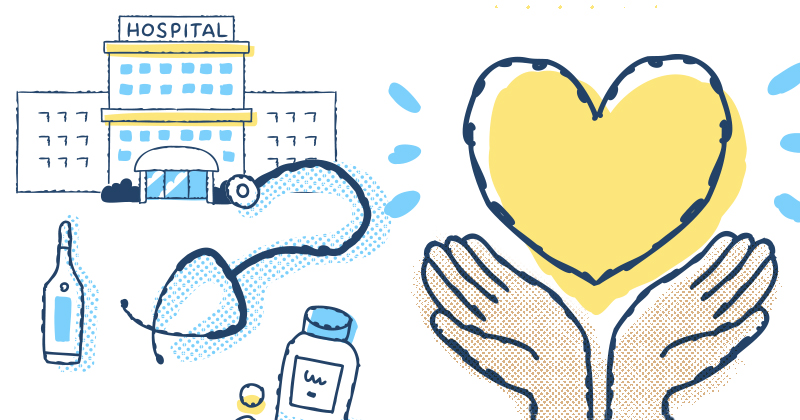Answering the Call for Social Workers

With new master of social work program, UD will prepare graduates to provide vital health and well-being services
The COVID-19 pandemic upended everyday life as families within Delaware and across the nation grappled with school closures, struggled with rising rates of unemployment, and navigated new physical and mental health challenges. While the most acute challenges of the pandemic are now behind us, many communities are still contending with its economic, social and mental health effects.
With a new master of social work program, the University of Delaware College of Education and Human Development (CEHD) will address a critical need for social workers and complement the state’s current offerings. Through research-informed coursework taught by faculty experts, community-engaged practicum experiences and specialization areas that meet community needs, the program prepares students to address the social problems affecting our diverse communities.
The need for social work in Delaware
Social workers support individuals and families through a wide range of life changes or challenges, including adoption, divorce, aging, terminal illness and loss of housing or employment. In fact, social workers are uniquely positioned to support communities in times of crisis; they are trained to step into high-stress situations and provide immediate support by connecting families with services. These professionals are especially vital members of historically disadvantaged communities.
Many social workers work within medical hospitals, psychiatric hospitals and community mental health clinics that offer a range of psychotherapy services, depending on the patient’s need.
“During the pandemic, many people, for the first time, began to pay very close attention to their mental health,” said Ohiro Oni-Eseleh, director of the program. “So, the need for people who are trained in providing mental healthcare skyrocketed. Organizations like community mental health clinics, hospitals and departments of health and human services no longer had the staff to provide care for the number of people that were coming to them, and it’s still the case.”
Social workers also work in schools with children of all abilities and their families to support students’ development, implement policies related to the educational environment and connect families to other resources.
In education specifically, a July 2022 National Center for Education Statistics study found that more than 80% of U.S. public schools reported that the pandemic negatively impacted student behavior and socio-emotional development. In partnership with families and teachers, social workers can lead interventions that foster these students’ self-awareness, self-management, social awareness, relationship skills and responsible decision-making.
The U.S. Bureau of Labor Statistics projects that the national need for social workers will grow 9% from 2021 to 2031. This growth roughly equates to about 74,700 openings for social workers each year, on average, over the next decade.
Within Delaware, there were 762 unfilled social work positions, on average, as of October 2022. And 100% of the school-based positions and 73% of the non-school-based positions required job candidates to hold a master’s degree in social work. Yet, despite this need, only one of Delaware’s institutions of higher education currently offers a graduate program in social work.
“Social workers play a vital role in connecting Delawareans with health and well-being services,” said Representative Valerie Longhurst of the Delaware House of Representatives. “Given the growing need for social workers and the staggering shortage of professionals to fill these jobs — nationally and here within the state of Delaware — it is critical that we work together to attract, prepare and graduate highly-effective social work professionals. I look forward to the launch of the University of Delaware’s new master of social work program, and for many of its graduates to remain in state as they pursue their professional careers.”
UD’s master of social work program
To address this need, CEHD has developed a researched-informed, student-centered and community-engaged master’s program in social work under Oni-Eseleh’s leadership.
“I am a very strong believer in the use of research to inform practice, and so, I always crave opportunities where I can see research informing practice and practice informing research as well,” Oni-Eseleh said. “The University of Delaware, as a Research I university, actually provides an opportunity to expand thinking, and I think in social work, that’s what we need.”
The program offers specializations in children and families, with practicum experiences at schools and children and family services, healthcare and mental health organizations; gerontology, with practicum experiences at nursing and assisted-living facilities and hospitals; and mental health and substance, with practicum experiences at healthcare and mental health organizations.
With one-year, 16-month, two-year and three-year pathways to degree completion, the program also allows students to customize their program timeline. Students who begin the program with at least two years of professional experience in human services organizations are also eligible to pursue a specialized pathway.
“I’m very pleased that our College is able to move forward with the master of social work program, which aligns well with UD’s mission to address the critical needs of our state, nation and global communities,” said Gary T. Henry, dean of CEHD. “We’re looking forward to helping the state of Delaware fulfill the pressing need for social workers and to continued collaboration with other institutions of higher education in Delaware.”
To learn more about the program, visit the program website.
Article by Jessica Henderson. Illustration by Jeffrey C. Chase.
Image caption: With a new master of social work program, the University of Delaware College of Education and Human Development will address a critical need for social workers and complement the state’s current offerings. Through research-informed coursework taught by faculty experts, community-engaged practicum experiences and specialization areas that meet community needs, the program prepares students to address the social problems affecting our diverse communities.



